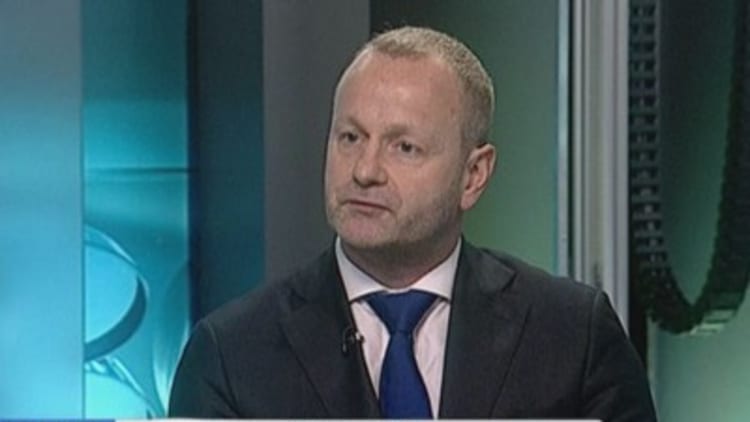
A key week for Greece's economic future drew to a close on Friday with the country facing the very real threat that it's running out of money and key analysts warming to the idea that it could be on its way out of the euro zone.
Euro zone finance ministers are set to meet Friday to discuss Greece's latest proposals to extend its loan agreement. But with Germany already rejecting the plan, there is very little hope that an agreement will be announced. Another meeting in Brussels for next week was already being touted before Friday's meeting even began. The main problem for the fiscally disciplined countries like Germany is that, despite the ground Greece has given up in the last week, it is still asking for the bailout loan without all of the strict austerity conditions that come with the money.
Greek economist Elena Panaritis, former member of the Greek Parliament and the World Bank, drew comparisons with the collapse of the Lehman Brothers in 2008. As with the fall of the big U.S. bank, market-watchers feel euro zone policymakers want to show the world they will only be pushed so far — with the result being Greece would be allowed to exit the euro zone.
Panaritis thought there was a "political statement as well as economic statement" being made during the negotiations. Randy Kroszner, a former U.S. Federal Reserve governor and the professor of economics at the University of Chicago Booth School of Business, agreed that there were comparisons between the two events.
"I think there a parallel, but the tools exist if the European Union wants to keep Greece in and if Greece is willing to stay in," he told CNBC Friday. "Even though it may be quite ugly, the likelihood of complete chaos is much lower. So that gives policymakers more willingness to say 'Hey, we'll take that risk'."
'Grexit' searches peak
Greek concerns have roiled markets since the anti-austerity Syriza Party came to power in Greece in January and have been a major focus all over the globe. Data from Google reveals that searches for the term "Grexit," a shortening of "Greek exit," has surged and has dwarfed similar interest shown throughout the whole of the euro zone sovereign debt crisis which begun in 2011.
On Thursday, the left-leaning Syriza Party offered a series of concessions to its previous hardline stance that it would unilaterally scrap the austerity measures imposed as part of the country's 240 billion euro ($270 billion) bailout. It pledged to work with the European Union and the International Monetary Fund in reworking the terms of the bailout despite reports that it is facing a backlash for within its own party.
The current program—which included the EU and IMF as creditors—is due to expire in little more than a week. Without further funds, Greece would soon run out of money raising the prospect of a default on its bonds and a possible exit from the euro zone. Even if the current plan is agreed upon Greece still faces the prospect of negotiating further loans in the future.
'Trojan horse'

On Friday, the decision from the Eurogroup of finance ministers has to be unanimous for any policy decision to go ahead. German officials shunned the plan calling it a "Trojan Horse" which left "immense room for interpretation." Germany's tabloid newspaper Bild ran a headline Friday thanking German Finance Minister Wolfgang Schaeuble, and showed it's joy at someone "finally saying no the the bankrupt Greeks."
There has also been talk of capital controls for Greece to stem the outflow of cash and emergency liquidity has also been provided to keep the country's banks afloat.
"Unless there is an agreement by the end of this week on Greece, the risk of capital controls and exit talks is likely to increase significantly," a team at Barclays, led by analyst Ajay Rajadhyaksha, said in a morning note on Friday.
The situation has become so heated in recent weeks that some prominent economists now believe the time is right for Greece to leave the euro zone. Mohamed El-Erian, the chief economic adviser at German-based Allianz, told CNBC on Tuesday that a Greek exit from the euro would cause "short-term chaos," but stated that it would not bring the global economy to its knees. On Thursday, Hans-Werner Sinn, president of the Munich-based Ifo Institute for Economic Research, told CNBC that Greece's creditors needed to "face the truth" and realize the country is bankrupt and advocated a return to the drachma for the struggling euro zone nation.
Others are a little more optimistic like Claus Vistesen, the chief euro zone economist at Pantheon Macroeconomics. he believes that cooler heads will eventually prevail and a deal would be secured despite initial German rejection.
"We think a deal is forthcoming, but Germany's swift rejection has increased the uncertainty," he said in a note late Thursday. Vistesen added that Germany is likely to stand isolated with its demand that Greece agree unconditionally to a continuation of the current program. He said that it is not a "viable strategy" for the country as it could ultimately mean that Germany is making a direct decision to expel Greece from the euro zone.

—Additional reporting by CNBC's Julia Chatterley.


